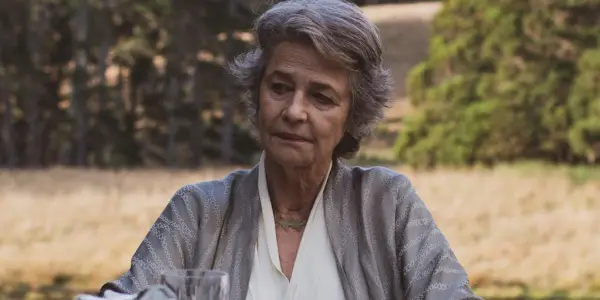JUNIPER: An Unlikely Bond Forms In Familiar Yet Understated Drama

Andrew Stover is a film critic/writer from the Chicagoland. His…
With Juniper, first-time feature director Matthew J. Saville doesn’t score points for originality, but he manages to extract emotion and vitality from Charlotte Rampling and George Ferrier, the lead actors in this slow-burn drama about the burgeoning friendship between a troubled teen and his bedridden grandmother. We have certainly witnessed this dynamic before, both in real-life and in cinema, where the relationship between people can deepen, preferably for the better, the more they get to know each other. Still, at the end of the day, it falls on the filmmaker to cultivate their desired approach and style to enrich generic conventions. Fortunately for Saville but particularly viewers, he overcomes predictable narrative beats and weaves together a finely crafted, softly affecting character study.
Rampling is Sensational
In the opening moments, Saville and DOP Martyn Williams‘ gorgeously frame New Zealand’s immense landscapes and apply a slightly murky color tone to contrast the beauty with a gauzy scent of gloom. The gloom fully materializes once Sam (Ferrier), the grieving and obstreperous son of Robert (Marton Csokas), is observed closely on a bed — his anguished eyes, wrinkled clothes, and inhibited behavior alluding to an internal wound.

The following scene transpires between Sam and his father. Robert informs Sam that Ruth (Rampling), Sam’s grandmother and Robert’s mother, injured her leg and is coming to say with them. It isn’t long before Robert leaves Ruth in the care of Sam and Nurse Sarah (Edith Poor). At first, Sam actively tries to avoid Ruth. “Look, I’ll help, but I don’t want to talk to her,” Sam proclaims. Howbeit, it is often the people we least expect who guide us back from the edge of a cliff. Sam and Ruth’s visible disdain for each other is expressed through brusque, off-color comments, leers, and occasional acts of aggression.
Immobile and splenetic, Ruth spends her days drinking copious amounts of alcohol and ardently claiming to have no regrets. As Sam learns more about Ruth and her stint as a war photographer, he starts to enjoy her company. Rampling, speaking in a disgruntled tone and reacting coolly to the people circling her, masterfully masks her character’s vulnerability. That is until Rampling allows that vulnerability to manifest itself in the form of a yearnful glance. She’s able to exude exact feeling — doubt, regret, anger, and joy — with sheer ease.
Saville‘s greatest strength is providing Sam and Ruth with an implicit reason to be drawn to each other. Saville makes it a priority to show that Sam and Ruth are both suffering, both contemplating, and both surrendering to the abyss that awaits them. He does this without making it painfully overt or schmaltzy, knowing when to have the characters communicate with gestures and actions, such as Sam dancing with Ruth and Sam giving in to her trivial demands. Kudos to Ferrier for making it so Sam, despite being prone to react fervently and recklessly, is not portrayed as an overly capricious teen. His internal struggle, as well as the progression of his connection to Ruth, is credible. You empathize with Sam; his grief and his inability to open up is heartbreakingly powerful and explicable. But life is not done with Sam, as he is able to unburden himself after Ruth puts in the effort to understand him.

It is fair to surmise that if the performers weren’t up to the task, Saville’s Juniper would be far less substantial. Thankfully, the always reliable Rampling and talented newcomer Ferrier interact comfortably with each other, upholding a heartfelt bond characterized by persiflage, harsh truths, and monumental gestures. Admittedly, there are several conveniences that even Rampling and Ferrier can’t overcome. A note that comes back to spur a last-minute realization works against the film’s credibility. Even so, Saville recovers with a final scene that tugs at the heartstrings.
Juniper: Conclusion
At its core, Juniper is a beautifully filmed and excellently acted drama about the pursuit of repairing familial relations, reacquainting oneself with the virtues of living, and learning to accept the inevitable. The script and execution may show hints of artificiality, but the actors, Rampling specifically, are captivating and emotionally in sync. Juniper is an understated first feature from Matthew J. Saville and is a strong indication that both Saville and Ferrier have promising careers ahead of them.
Juniper will have a limited theatrical release on February 24, 2023.
Watch Juniper
Does content like this matter to you?
Become a Member and support film journalism. Unlock access to all of Film Inquiry`s great articles. Join a community of like-minded readers who are passionate about cinema - get access to our private members Network, give back to independent filmmakers, and more.
Andrew Stover is a film critic/writer from the Chicagoland. His film & TV reviews can be found on Film Inquiry & Film Threat.













